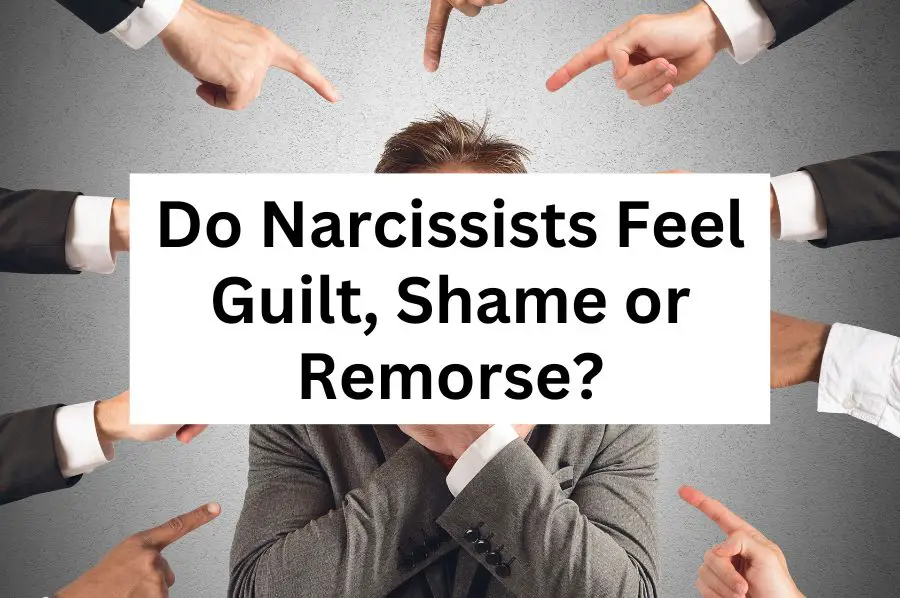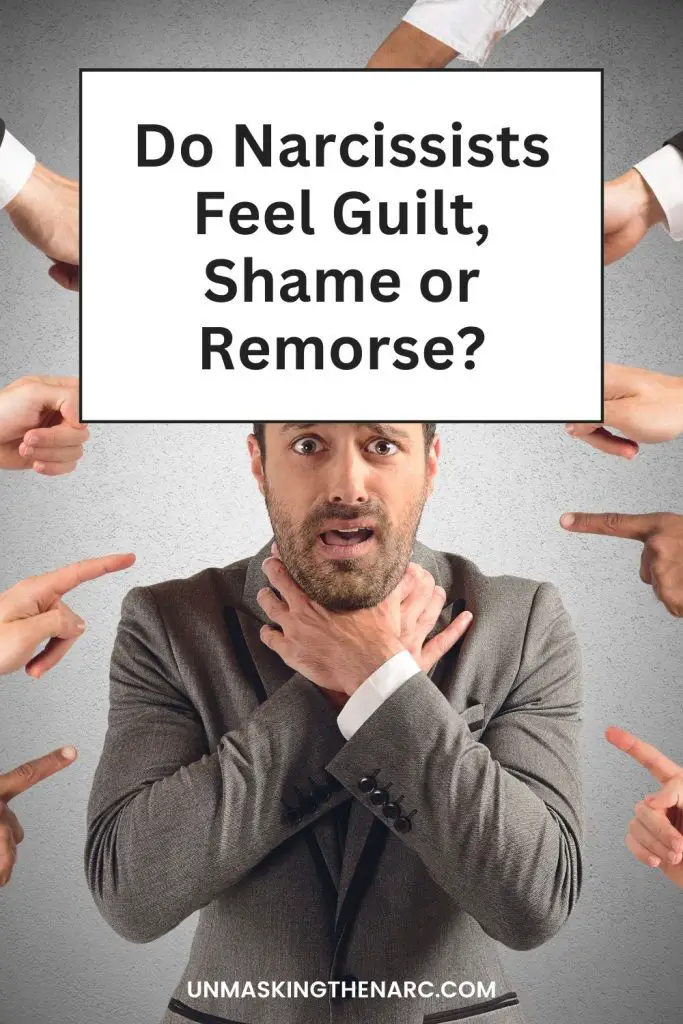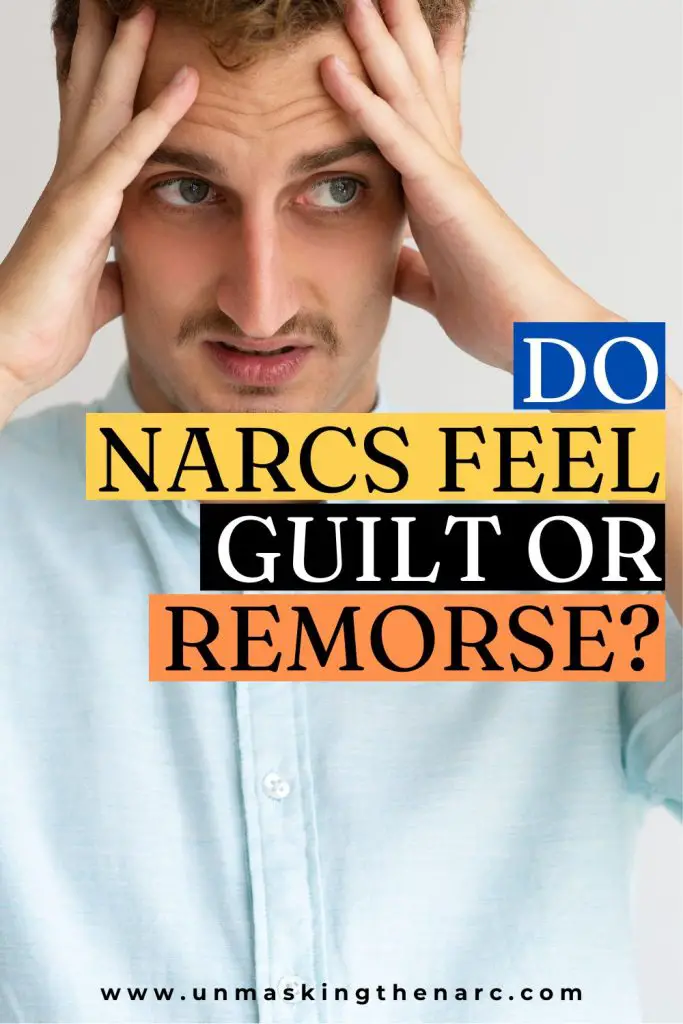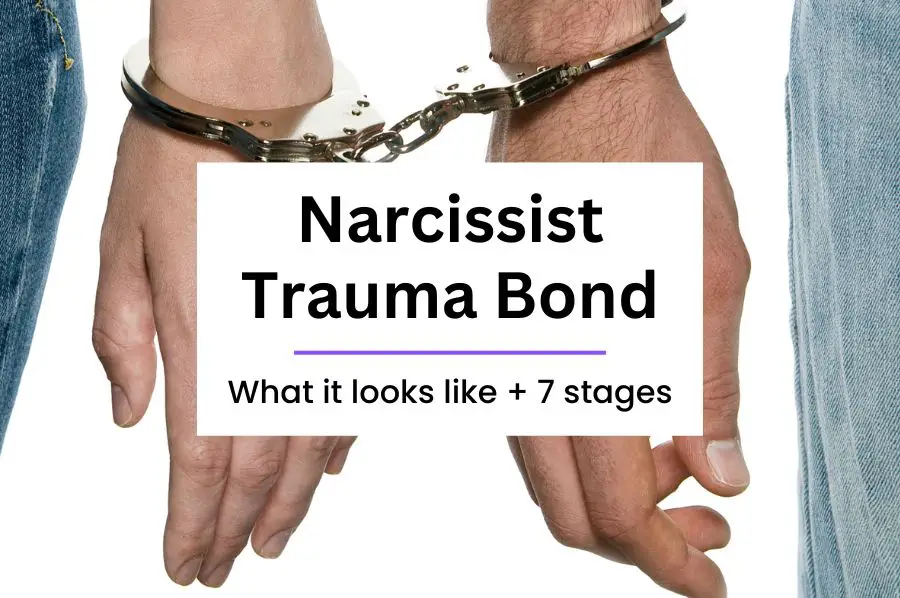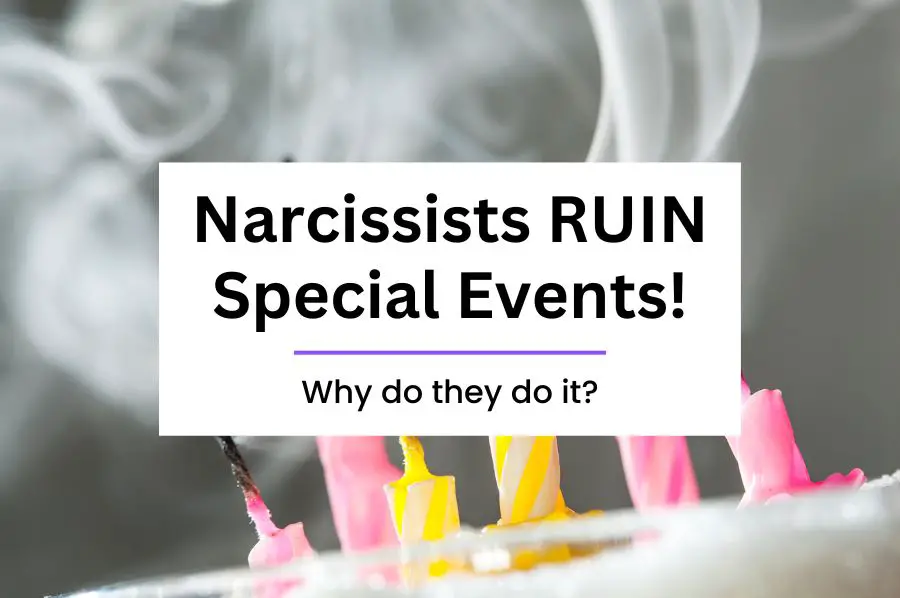For anyone who’s been through a narcissistic relationship or is still dealing with narcissism in their life, we all end up mind-boggled with the same question. Do narcissists feel guilt, remorse or shame for their words and actions?
Narcissists lack the ability to feel guilt because they cannot feel compassion or empathy towards another human being (although they’ll often fake it). To feel remorse, they’d have to be able to take responsibility for their own actions, which is simply not going to happen.
However, regret can sometimes be felt by a narcissist, purely because they are experiencing the loss of (or about to lose) the narcissistic supply that they need for inner relief.
When it comes to shame, grandiose narcissists never feel shame, while covert narcissists feel it on the regular!
Let’s delve in and explore the questions – do narcissists ever feel guilt, remorse, regret or shame?
This post may contain affiliate links. For more information, see our disclosures here.
A Look at Narcissism
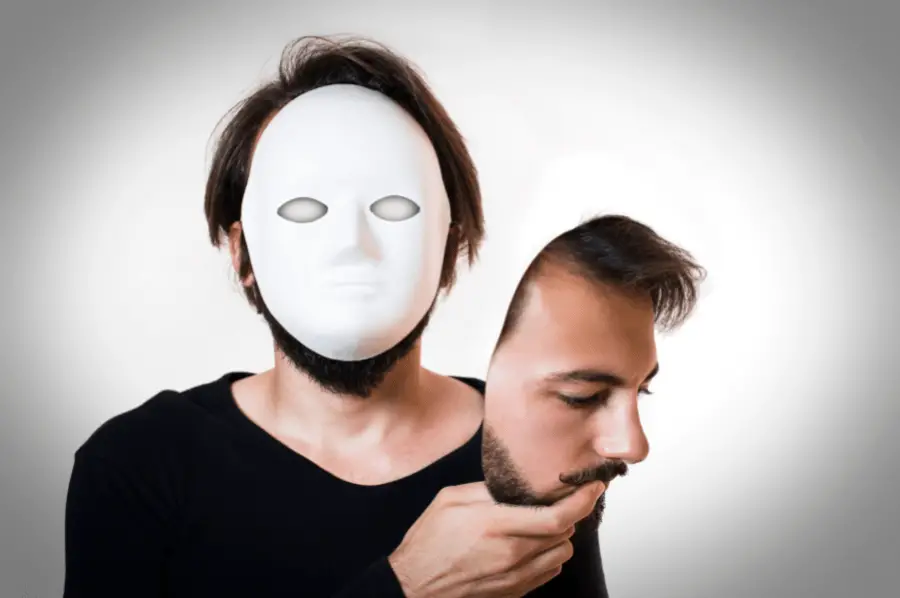
Narcissism is a personality disorder, which occurs as a result of a traumatic childhood environment or event. It was developed as a defence mechanism against intense feelings of shame, unworthiness, defectiveness, rejection and/ or abandonment.
Narcissism from a Spiritual Aspect
From a spiritual sense, the person simply could not bear to feel the pain of their inner wounds, so they made the subconscious choice to disown that part of themselves. They cut off access to their True Self.
By disconnecting from their True Self, there was nothing left to run their life but their ego. For the ego to protect the person from their own wounds and flaws, a False Self was created.
This split in consciousness is called ‘Narcissism,’ which can present itself on a spectrum from medium to high degrees.
The role of the False Self is to create a reality whereby the narcissist is superior, special and perfect.
The problem is that for the narcissist’s false reality to continue to exist, it needs to be constantly fed and validated by the outside world. This is why narcissists need continual attention because that serves to feed their ego and their false illusion of ‘specialness.’
What the narcissist is inherently seeking is life force energy, which they no longer have access to themselves. That is their drug, which temporarily alleviates the pain of the empty black void that’s left inside of them.
The narcissist needs attention and validation from other people in order to extract the life force they so desperately seek in order to feed their False Self and false reality.
Types of Narcissists
There are four main types of narcissists – malignant, altruistic, overt and covert.
However, to investigate if narcissists feel guilt or remorse, we will simplify them into two categories – grandiose and vulnerable.
Grandiose (Overt) Narcissist
As the term implies, grandiose narcissists are extroverted, confident, charming and pretty damn sure of themselves.
- Extroverted
- Inflated self-worth
- Superiority complex
- Entitled and arrogant
Grandiose narcissists are often easy to pick out of the crowd as they have such an over-inflated sense of importance and demand the spotlight, particularly in social settings.
The False Self dictates that they are the most superior at everything and that they deserve to be centre stage, just merely for existing.
A grandiose narc genuinely views themselves as a God who must be worshipped by all as no one else sits above their sheer brilliance.
The grandiose narcissist will protect their False Self from the truth that they are not superior, perfect and above all others.
Vulnerable (Covert) Narcissist
The vulnerable narcissist is the exact opposite to the grandiose, which makes them a lot harder to spot.
- Introverted
- Low self-worth
- Inferiority complex
- Extremely sensitive to criticism
Vulnerable narcissists aren’t confident and self-assured. They’re much more introverted, with very low self-esteem. Their timidity can easily be mistaken for modesty, which is how they manage to trap people and fly under the radar even being a narcissist at all.
Unlike the grandiose, who go after what they want and demand acclaim, the covert will grumpily sit around complaining about how they’ve missed out on everything.
They won’t recognise that their lack of success is due to their own shortcomings or willingness to try. No, their failures are the result of a world that was just never fair to them.
Take the Covert Narcissism Quiz to see if this fits the person you’re dealing with.
The vulnerable narcissist will protect their False Self from their deep inner shame and inferiority by deflecting all criticism.
The thing that all narcissists have in common, no matter what category they fall into is their absolute self-serving agenda. The only needs that matter to a narcissist are their own. Everything else is completely irrelevant and quite frankly an inconvenience to them!


Do Narcissists Feel Guilt?

Let’s explore the question, do narcissists feel guilt on any level? First up, we need to find out exactly what guilt entails.
- GUILT – An emotion or feeling that you’ve done something morally wrong that goes against your own ethical standards.
The things that people do or don’t feel guilty about can vary greatly given that it’s based around a person’s moral compass. For example, religious, community and family views can all affect what someone believes to be right and wrong.
Having such a wide range of parameters makes guilt a rather fluid experience with no one-size-fits-all rule.
Guilt is your conscience keeping you in check.
PROBLEM 1: Narcissists Lack a Conscience
When narcissists disown their True Self, they cut off the ability to experience all of the things that make us inherently human.
Without a conscience, narcissists cannot experience:
- Love
- Compassion
- Empathy
- Kindness
So, if narcissists don’t have a conscience, then they’re not going to have that subconscious part sending signals to their emotional body that they’ve gone against a moral code.
In fact, people with NPD (Narcissistic Personality Disorder) are amoral. This means that they don’t have a moral code and therefore are not influenced by right or wrong.
They can feign morality if it serves their storyline or agenda in some way, but it’s not authentic. The narcissist is merely regurgitating the ethics of other people or their culture as a means of gaining narcissistic supply in some way.
Narcissists also lack empathy, meaning that they do not have the ability to step inside someone else’s shoes and tap into how that person might be feeling.
In the narcissist’s warped reality, the whole world revolves around them. They don’t have the compassion, empathy, love or care to view other people as living, breathing beings with their own sovereign lives.
To them, other people are viewed as tools for them to gain resources, energy, attention and admiration to feed their ego. That is it.
PROBLEM 2: Narcissists Lack Empathy
Do narcissists feel guilt if they don’t have empathy? A big part of feeling guilty about something you’ve said or done is the ability to empathise with someone else’s position.
Narcissists have very low levels of empathy, which means they can sometimes understand how other people are feeling, however, without a conscience, they simply do not care about how they feel. In other words, the narcissist’s empathy is not authentic or genuine.
They can fake it in order to play the victim or get people to play into their hands, but without having access to their inner being, they cannot experience genuine empathy.
Given that the narcissist isn’t able to feel authentic empathy towards others with regards to their own actions, they are also unable to see anything from anyone’s perspective but their own.
Without having that capability to see any viewpoint outside of their own universe (where they are the central focus), guilt doesn’t even come into play.
PROBLEM 3: All Guilt Feelings Are Evaded
If a narcissist is hit with a narcissistic injury (the triggering of an inner wound), it seems possible for them to feel a tiny semblance of something similar to guilt for an instant.
However, the narcissist isn’t able to sustain that feeling as their ego won’t allow it. Remember, it’s the ego’s role to protect the narcissist from any truth about them being a flawed human being.
So, what the narcissist is actually feeling in that moment is criticism, which is the pointing out of wrongdoing. This accusation of not being perfect goes directly against their false reality, therefore it’s now seen as a direct attack against them and their whole facade.
Their False Self will want to eradicate this perceived attack as quickly as possible in order to protect itself.
The ego sees that you were the one to have brought the criticism to them, therefore you have now been located as the threat. The ego will set its crosshairs on you and work to annihilate you (the threat). The narcissist needs to get back to a place of stasis, where they are the godly centre of the universe with all energy and attention going directly to them.
This is where the narcissist may lash out in a rage, blaming you for all of the things that they’re actually doing. They’ll project all of their disowned wounds onto you to avoid having to feel any guilt or discomfort. Or, they may dish out the silent treatment, where they withhold from you as a punishment for your actions.
Narcissists can justify the most despicable behaviour, twisting everything around and making themselves forever the victim. Whatever happens will always be your fault.
The narcissist’s actions are always blamed on someone else’s behaviour, which is how they justify everything they do and evade all feelings of guilt.

Do Narcissists Feel Remorse or Regret?
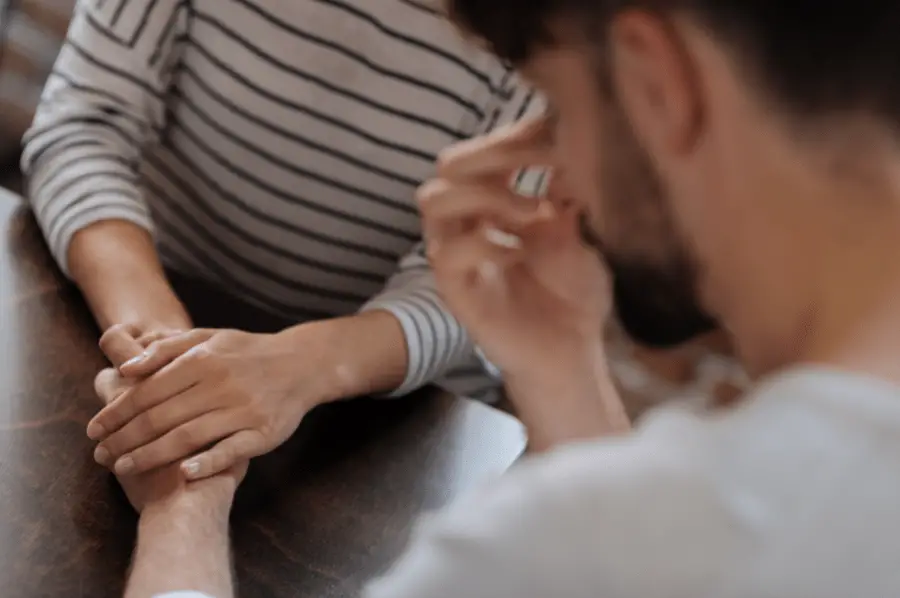
Now that we’ve covered the question of do narcissists feel guilty, let’s explore the next logical question – do narcissists feel remorse or regret?
Remorse and regret are two very different feelings and emotions, which is why narcissists can experience one, but not the other.
Remorse vs. Regret
REMORSE
Remorse is encased in being able to take responsibility for your own actions and mistakes. It’s often wrapped up with guilt and pain around hurting another person or creature.
Someone who feels true remorse will usually offer a heartfelt, authentic apology and endeavour to avoid repeating that behaviour again.
REGRET
Regret is all about wishing you hadn’t taken an action or that you hadn’t been caught for said action. If someone regrets something it’s usually because they’ve suffered some kind of personal loss or damage as a result of an action.
Regret can manifest as sadness, grief or even anger, but it’s usually feeling all of those things for yourself, not anybody else.
Narcissists and Remorse or Regret
Given what we know about narcissists and their self-serving lives, it’s easy to see that they can’t truly feel remorse, yet they can certainly experience regret.
The role of the narcissist’s ego is to actively refuse all responsibility for any negative behaviours. To accept accountability would be to admit that they are not a perfect being after all, which would result in their whole house of cards to come falling down.
For the narcissist to feel remorse for any of their words or actions, they would need to be able to experience empathy, which we know they can’t.
However, a narcissist can most definitely feel regret for some of their actions and choices. Not because they feel bad for hurting others, but because their access to receiving energy, resources, sex, money or attention has been threatened.
Narcissists feel regret for what they’ve lost or are set to lose. Their regret is only ever about themselves and never about anybody else.
From here, the narcissist will learn how to lie, manipulate and hide their behaviours even better for the future.
Don’t be fooled into thinking the narcissist won’t use false remorse as a manipulation tool. In fact, this is one of their well-used tactics for playing on people’s compassion and empathy so that they’ll allow the narcissist back into their lives.
But the narcissist has no interest in being a team player or growing on a soul level. All the narcissist is ever motivated by is obtaining narcissistic supply to feed their False Self and alleviate their empty inner black hole.
RELATED POSTS:

Do Narcissists Feel Shame?

Following on from do narcissists feel guilt, let’s explore do narcissists feel shame.
As opposed to guilt, which is the feeling that you’ve done something wrong, shame is a deep feeling that your entire being is wrong. It’s the belief of being inherently flawed, making you feel as though you’re unworthy of love and acceptance.
- Guilt – Feeling bad for doing something that’s perceived to be wrong.
- Shame – Feeling like your whole self is wrong.
Interestingly, grandiose narcissists do not feel shame, whereas covert narcissists do.
The GRANDIOSE Narcissist
The mantra of the grandiose narcissist is, “I am perfect, I am superior, I am a God.”
While one of the grandiose narcissist’s core wounds is quite often shame and self-loathing, their defence mechanism has inverted their reality to protect themselves from that truth.
Their ego has created a false reality whereby they are so extremely superior and special that it oozes out of their pores as arrogance and entitlement.
On a conscious level, the overt variety of narcissists isn’t able to feel shame because it’s one of the very things that they utterly refuse to acknowledge within themselves. To do so would be to admit that they’re a flawed human being, just like the rest of us.
The whole undercurrent of grandiose narcissism is that they truly believe (in their delusional reality) that they are above all others. For someone who thinks they’re perfect, there’s no room for feeling like their whole being is wrong (shame).
Grandiose narcissists do not feel shame.
Their False Self has created a reality where they view themselves as ‘special’ in order to protect themselves from their darkest inner truth – that they are a flawed human being. With the refusal to acknowledge their own faults, they have no capacity to feel shame.
The COVERT Narcissist
Covert narcissists feel shame almost every day of their lives. Their core wound is very much defectiveness and unworthiness.
The covert narcissist needs constant attention and approval, not to pump up their inflated ego, but in order to feel like a worthwhile human being.
They have extremely low self-worth with no way of finding that from within themselves.
With the severing of their True Self, they’ve lost their connection with the abundant divine life force, which is what gives us the ability to be our own source of love, validation, security and survival.
The only way for a covert narcissist to gain self-worth is through the praise, attention and approval of others. They must seek their worth from outside of themselves.
This is why covert narcissists are much more likely to find an over-giving codependent partner and lock them in for the long term. They need the security of having a constant stream of narcissistic supply just so that they can feel okay about themselves and not fall into their inner pit of despair.
Vulnerable narcissists quite often have a constant stream of physical ailments (whether real or fictitious) so they are always in the ‘victim’ role. This is a surefire way of securing the never-ending attention that they need for their psychological survival.
While grandiose narcissists have zero comprehension of the thoughts and emotions of others, covert narcissists are actually acutely aware of those things. Because their entire self-esteem comes from other people, they are hypersensitive to how others perceive them.
If the covert narcissist isn’t getting the attention that they need from others to temporarily inflate their sense of self-worth, they will dip back down into shame.
This is when you’ll notice a covert narcissist slip into their usual manipulation tactics to extract the attention they’re so desperately seeking to feel okay again.
They’ll often use passive-aggressive techniques like silent treatment, stonewalling, withholding, underhanded devaluing comments and playing a total victim. Covert narcissists can also fly into narcissistic rages in order to self-avoid and spew all of their disowned inner hurts onto the nearest person.
Vulnerable narcissists regularly feels shame.
They have such low self-worth that they need constant attention and approval from those around them to artificially feed them self-worth. Narcissistic supply is a temporary self-medication for their deep inner feelings of defectiveness, self-loathing and unworthiness.

▶️ VIDEO: Do Narcissists Feel Guilt, Remorse or Shame?

Do Narcissists…
Do Narcissists Know They Are Hurting You?
This is a question that I grappled with a lot after leaving my covert narcissist ex. It was really hard for my compassionate heart to comprehend that someone who claimed to have loved me for twenty years, could have intentionally hurt me over and over again.
Unfortunately, the answer is yes, narcissists do know that they are hurting you, it’s just that they simply do not care.
They live in a distorted reality, created by a conscienceless False Self, which does not see other people as living, breathing beings with their own hopes, dreams and desires.
The nature of narcissism is that they have disowned the true creator of all things (whatever type of ‘God’ that is for you) and replaced it with themselves. Now, they are the pinnacle of everything, the centre of the universe.
Everything that exists in their universe is simply there to serve them. The people, things and experiences can only ever be tools for them to gain the life force energy they need to sustain their false reality.
So yes, the narcissist is fully aware that their actions may be hurting you, but they are so detached from humanness that it doesn’t bother them. They don’t have the capacity to feel compassion, empathy, love or kindness, so there are no consequences for their actions.
Everything is transactional to a narcissist.
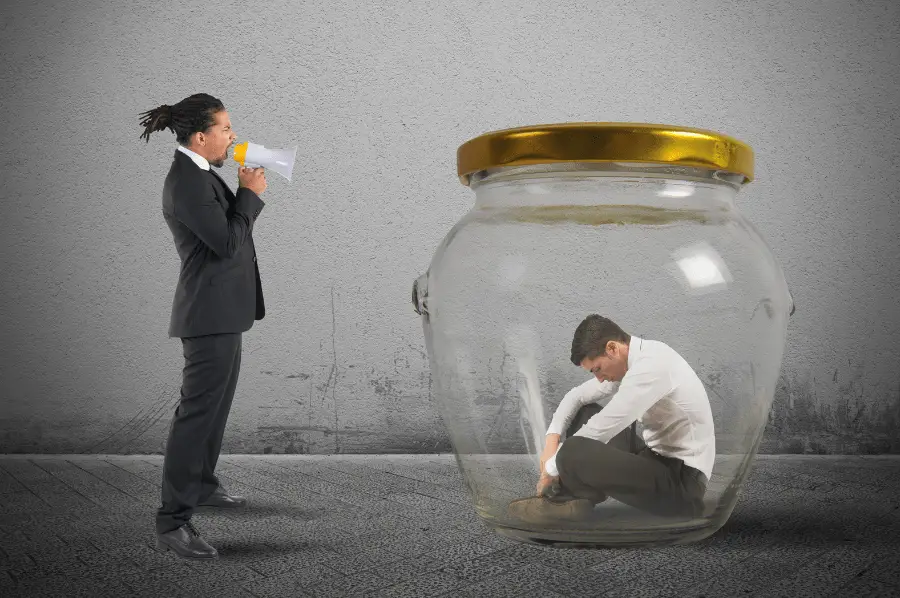
Do Narcissists Get Embarrassed?
Being embarrassed is a self-conscious emotion, often coupled with guilt and shame. It’s an intense public feeling of being exposed, which can bring up awkwardness and regret.
Narcissists have no problem embarrassing others and will even get off on the power that they feel by being able to control someone else’s emotions so heavily.
I’m sure many of us in this community have been publicly humiliated by a narcissist, who then went on to exacerbate the situation, laugh out loud and continue to bring it up for years to come.
They can dish it, but they can’t take it.
Humiliation is also grounded in shame, which can lead to contempt and hatred.
While grandiose narcissists never feel shame or guilt around their actions, they are extremely aware of their appearances and how others view them. These narcissists need others to admire them and give them attention so that they can keep feeding their false illusion of grandiosity.
Covert narcissists can feel embarrassment and humiliation easily as they’re so sensitive to what others think of them and shame is always hiding under the surface.
Either way, narcissists refuse to be accountable for their actions, so if they are put in a position of embarrassment or humiliation, they will instantly blame someone else for that occurrence.
They will get extremely angry if they are portrayed in a way that doesn’t support their agenda or public image because that threatens their storyline and stream of supply.
Do Narcissists Miss You Once You’re Gone?
Sure, narcissists can miss you once you’re gone, but not for the reasons you were hoping for.
If the narcissist has moved on to a solid new supply, who’s giving them copious amounts of attention, adoration, sex, money, status and so on, you will be a long-forgotten toy.
However, if they haven’t yet secured a new supply or their next person isn’t panning out as they’d hoped, they may be missing you.
But it’s important to understand that they don’t miss you as a person, because they never truly saw you as a person. They can only ever miss what you gave to them.
Here’s what a narcissist really means when they say, “I miss you:”
- “I miss how much you loved me.”
- “I miss how much you did for me.”
- “I miss what I gained from being with you.”
- “I miss your money, sex, accommodation, meals etc.”
- “I miss what I got from you.”
| READ: Does the Narc Miss You? → |

Summary
In conclusion, do narcissists feel guilt, remorse, regret or shame? Here are the short answers to the larger questions.
Narcissists don’t feel guilty because they are amoral, meaning that they do not have an inner moral code. Everything they do will always be justified by their ego so that they never have to face the truth – that they are a flawed human being just like everybody else.
Narcissists do not feel remorse because that would entail taking responsibility for their behaviours. To truly feel remorse, you need to be able to feel guilt, which we know they do not experience.
Narcissists can feel regret as it relates to themselves. They don’t feel regret for hurting others, however, they can feel regretful of their actions if those actions result in them losing precious resources or energy, which they value.
• Grandiose narcissists do not feel shame – they think that they’re perfect, therefore no flaws exist within them to be ashamed of.
• Vulnerable narcissists regularly feel shame – their self-esteem is so low that they have no way of regulating self-worth besides extracting it from other people.
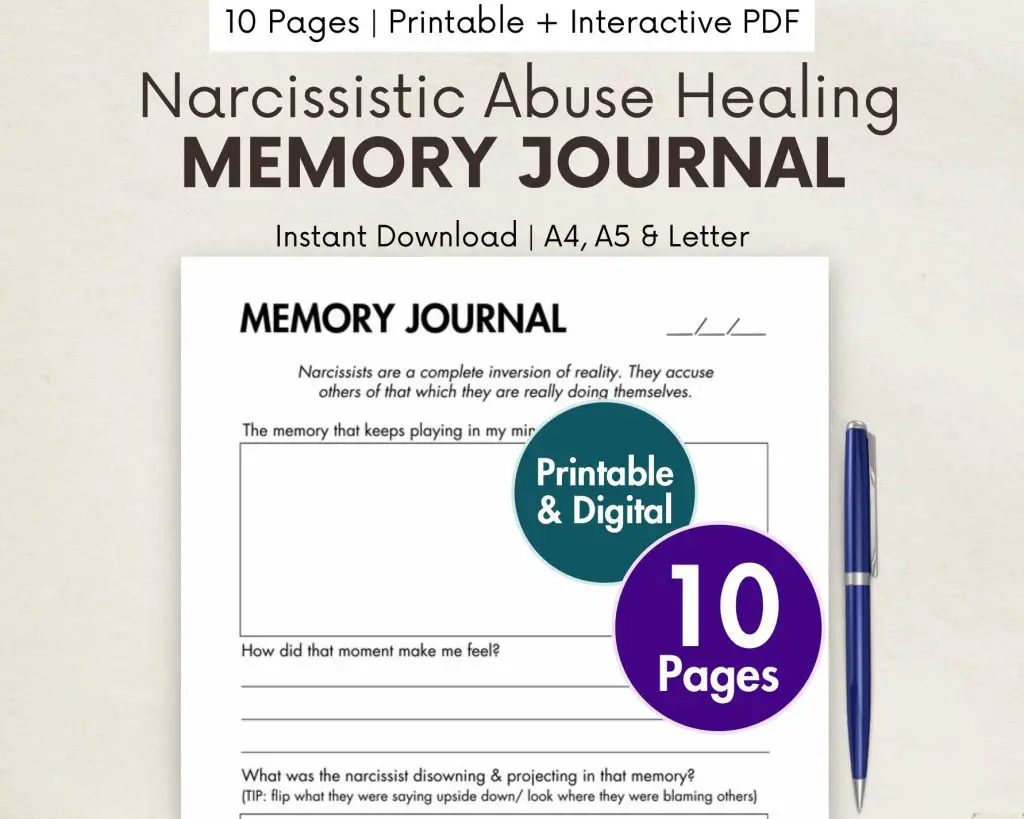
Memory Journal
Release the painful memories once and for all!
- Journal recurring thoughts
- Sort through what’s yours vs. theirs
- Identify your inner wounds to heal
- Return the narcissist’s disowned wounding
- Step-by-step guidance
- PRINTABLE & DIGITAL


